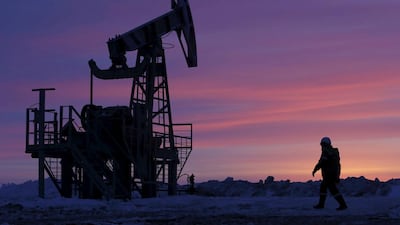Brent fell below $30 on Tuesday as concerns over demand outweighed the stimulus measures being taken by central bankers around the world to stave off the economic threat presented by the coronavirus.
Brent was down 1.5 per cent trading at $29.58 per barrel, while West Texas Intermediate was down about 0.6 per cent at $28.53 per barrel at 5.02pm UAE time.
Brent is teetering close to the $28.94 level seen in January 2016, which prompted Saudi Arabia and Russia to form an alliance to draw back global inventory and prop up prices in order to counter the surge in US shale.
Stocks also suffered their worst rout in more than three decades with the Dow Jones Industrial Average closing down about 13 per cent on Monday, its steepest one-day drop in 30 years. Circuit breakers, which kick in when stocks at Dow drop more than 7 per cent in trading session, were activated for the third time this week, prompting a 15 minute halt in trading. The Philippines, which has placed its capital Manila with 12 million people under lockdown, suspended trading on its stock exchange this week.
"Yesterday was the worst single day for the Dow Jones since 1987, before futures jumped higher after the close, in simply yet another example of the unprecedented period of volatility in global financial and oil markets the current situation is causing," consultancy JBC Energy said in a note.
"Aside from outright oil price movements, which have been setting records for volatility, product pricing has now begun to catch up and is also throwing up some extreme signals," the report added.
Though there were signs on Tuesday that the sell-off in global equity markets was losing momentum. Hong Kong's Hang Seng and Japan's Nikkei 225 index both closed slightly higher, and the Euro Stoxx 50 was 0.5 per cent lower at 3.22pm UAE time.
Opec producers including Saudi Arabia are preparing to significantly ramp up production following the expiry of a global restriction pact, which drew back 1.7 million barrels per day from the markets since January. The kingdom is expected to bring 12.3m bpd of supply to the markets in April, with the UAE also significantly raising its output by a million bpd to 4m bpd.
Saudi Aramco, the world's largest oil-exporting company, said in an investor call on Monday that it was "comfortable" with $30 oil prices and could maintain its shareholder commitments even when prices go any lower.
The producer said it could maintain output at full capacity of 12m bpd for the rest of the year with no incremental investment in capex or opex, and is evaluating for how long it can draw on its global inventories to supply the additional 300,000 bpd.
Saudi Arabia's crude exports, meanwhile, are expected to exceed 10m bpd over the coming months as the kingdom plans to offset domestic use of oil with gas, the kingdom's energy ministry said on Tuesday.
Gas from the Fadhili plant will be used in place of 250,000 bpd of crude, which will be diverted for exports, the ministry added.
Saudi Arabia's indication that it will pump at full capacity, as well as reports of a failure of mediation attempts between Opec and non-Opec producers, suggests the market could be flooded with cheap oil at a time of slowing demand.
"The Saudis can certainly supply crude by drawing down from storage but they wanted to push it out there by really discounting it and shoving it into storage tanks downstream, they definitely can supply 12.3m bpd," said Greg Priddy, global energy and Middle East director at consultancy Stratfor.
He added, however, that if prices continued to fall and no agreement was forthcoming, the kingdom's strategy may need to change again "because they're hurting their reserves at such a rapid pace".


